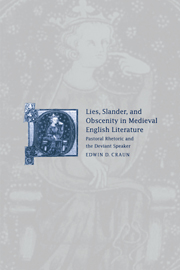 Lies, Slander and Obscenity in Medieval English Literature
Lies, Slander and Obscenity in Medieval English Literature Book contents
- Frontmatter
- Contents
- Acknowledgments
- Note on quotations and translations
- Standard abbreviations
- Introduction
- 1 The pastoral movement and deviant speech: major texts
- 2 The lies of the Fall, the tongues of Pentecost: typing and converting the deviant speaker
- 3 Exemplifying deviant speech: murmur in Patience
- 4 Confessing the deviant speaker: verbal deception in the Confessio Amantis
- 5 Reforming deviant social practices: turpiloquium/scurrilitas in the B Version of Piers Plowman
- 6 Restraining the deviant speaker: Chaucer's Manciple and Parson
- Bibliography
- Index
- CAMBRIDGE STUDIES IN MEDIEVAL LITERATURE
6 - Restraining the deviant speaker: Chaucer's Manciple and Parson
Published online by Cambridge University Press: 31 October 2009
- Frontmatter
- Contents
- Acknowledgments
- Note on quotations and translations
- Standard abbreviations
- Introduction
- 1 The pastoral movement and deviant speech: major texts
- 2 The lies of the Fall, the tongues of Pentecost: typing and converting the deviant speaker
- 3 Exemplifying deviant speech: murmur in Patience
- 4 Confessing the deviant speaker: verbal deception in the Confessio Amantis
- 5 Reforming deviant social practices: turpiloquium/scurrilitas in the B Version of Piers Plowman
- 6 Restraining the deviant speaker: Chaucer's Manciple and Parson
- Bibliography
- Index
- CAMBRIDGE STUDIES IN MEDIEVAL LITERATURE
Summary
“Thou getest fable noon ytoold for me,
For Paul, that writeth unto Thymothee,
Repreveth hem that weyven soothfastnesse
And tellen fables and swich wrecchednesse.
Why sholde I sowen draf out of my fest,
Whan I may sowen whete, if that me lest?
For which I seye, if that yow list to heere
Moralitee and vertuous mateere,
And thanne that ye wol yeve me audience.”
(Tales.X.31–9)When the Parson of The Canterbury Tales refuses to tell a fable, he does more than announce his non-fictive catechesis, more than reflect indirectly on the Manciple's Ovidian fable of Phebus and the crow. Addressed by the Host as “Sire preest,” he speaks as a priest about the speech appropriate for a priest. Although pastoral discourse on deviant speech, as we have seen, singles out certain social groups as prone to certain Sins of the Tongue (lawyer to lying, monk to murmur, entertainer to scurrility), it rarely distinguishes between cleric and laic, setting different, or stricter, norms for the clergy. On fables, it does. Under ociosa verba (idle or empty words) or vaniloquium, six pastoral texts, including one of the two which Siegfried Wenzel has found to be the closest, of known texts, to the Parson's treatment of the Seven Sins, forbid fables (fabulae) and other trifling speech (nugae) to priests, lest such idle words compromise their authority as religious teachers.
- Type
- Chapter
- Information
- Lies, Slander and Obscenity in Medieval English LiteraturePastoral Rhetoric and the Deviant Speaker, pp. 187 - 230Publisher: Cambridge University PressPrint publication year: 1997


